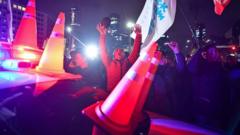On Tuesday night, as 19-year-old student Hwang witnessed the protests in Georgia on TV, an unexpected address from President Yoon shifted the spotlight to South Korea. The president announced martial law, a move seen as a response to ongoing political turmoil, including a deadlock over a budget bill and corruption investigations involving his cabinet. Hwang, along with many others, felt compelled to protest, declaring, "It's important for me to be here to show that we are against what Yoon tried to do."
The night was heavily marked by unrest, as police prepared for potential disorder outside the National Assembly. Yoon's controversial address ignited concern among citizens, reminiscent of the country's struggles with authoritarian rule before its transition to democracy in 1987. The military's declaration that parliamentary activities would be suspended under martial law added to the tension. "This was a move I never expected to see in the 21st century in South Korea," remarked student Juye Hong.
As news of the martial law spread, opposition leaders quickly mobilized, with Democratic Party leader Lee Jae-myung urging a live assembly and protest outside parliament. Crowds swelled as protesters chanted, "no to martial law," clashing with police in a display of defiance. Amidst the chaos, individuals expressed their fears of a return to draconian measures akin to North Korea.
Panic gripped the city as conflicting reports emerged of military involvement and impending media restrictions. Journalists maintained communication to navigate the rapidly changing landscape, while one opposition spokesperson faced soldiers at gunpoint during the escalating standoff. Ahn Gwi-ryeong's confrontation with armed troops later went viral, symbolizing the desperate fight for democratic norms.
Simultaneously, opposition lawmakers navigated barricades and police obstacles to reach the assembly chamber. The dramatic scene consisted of lawmakers crawling through security or clambering over fences, fueled by a unified sense of urgency. "Democracy is strong here," said MP Hong Keewon. "The military needs to listen to us, to the constitution."
By 01:00 local time, the assembly room was hastily fortified as lawmakers banded together to vote against Yoon's declaration. At 04:30, Yoon reappeared on TV to announce the withdrawal of martial law, met with cheers from the crowds outside.
Despite the temporary reprieve, public fury remained palpable. Thousands rallied for Yoon's resignation, indicating a turbulent political climate ahead, as various factions prepare for potential impeachment proceedings. “We are a strong democracy…But Korean people want to be safe - President Yoon must resign or be impeached,” stated Democratic Party politician Yang Bu-nam.
South Korea stands at a crossroads as its citizens reflect on the fragile balance between liberty and authority. The events of that single night serve as a reminder of the ongoing struggle to preserve democratic ideals in the face of political upheaval.
The night was heavily marked by unrest, as police prepared for potential disorder outside the National Assembly. Yoon's controversial address ignited concern among citizens, reminiscent of the country's struggles with authoritarian rule before its transition to democracy in 1987. The military's declaration that parliamentary activities would be suspended under martial law added to the tension. "This was a move I never expected to see in the 21st century in South Korea," remarked student Juye Hong.
As news of the martial law spread, opposition leaders quickly mobilized, with Democratic Party leader Lee Jae-myung urging a live assembly and protest outside parliament. Crowds swelled as protesters chanted, "no to martial law," clashing with police in a display of defiance. Amidst the chaos, individuals expressed their fears of a return to draconian measures akin to North Korea.
Panic gripped the city as conflicting reports emerged of military involvement and impending media restrictions. Journalists maintained communication to navigate the rapidly changing landscape, while one opposition spokesperson faced soldiers at gunpoint during the escalating standoff. Ahn Gwi-ryeong's confrontation with armed troops later went viral, symbolizing the desperate fight for democratic norms.
Simultaneously, opposition lawmakers navigated barricades and police obstacles to reach the assembly chamber. The dramatic scene consisted of lawmakers crawling through security or clambering over fences, fueled by a unified sense of urgency. "Democracy is strong here," said MP Hong Keewon. "The military needs to listen to us, to the constitution."
By 01:00 local time, the assembly room was hastily fortified as lawmakers banded together to vote against Yoon's declaration. At 04:30, Yoon reappeared on TV to announce the withdrawal of martial law, met with cheers from the crowds outside.
Despite the temporary reprieve, public fury remained palpable. Thousands rallied for Yoon's resignation, indicating a turbulent political climate ahead, as various factions prepare for potential impeachment proceedings. “We are a strong democracy…But Korean people want to be safe - President Yoon must resign or be impeached,” stated Democratic Party politician Yang Bu-nam.
South Korea stands at a crossroads as its citizens reflect on the fragile balance between liberty and authority. The events of that single night serve as a reminder of the ongoing struggle to preserve democratic ideals in the face of political upheaval.






















